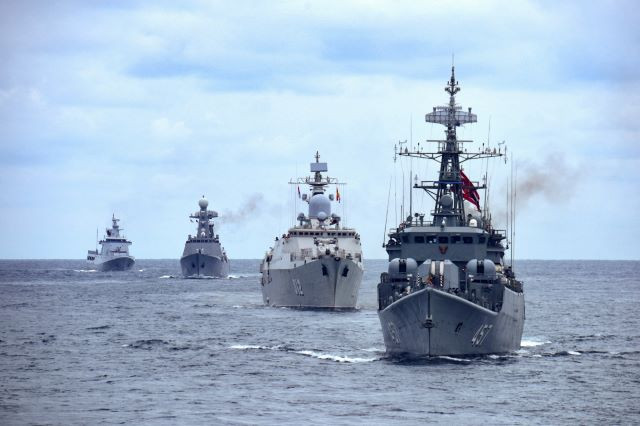Popular Reads
Top Results
Can't find what you're looking for?
View all search resultsPopular Reads
Top Results
Can't find what you're looking for?
View all search resultsFriendly gunboat diplomacy
It is safe to say that such HADR exercises are beneficial as a confidence-building measure among countries amid heated regional dynamics.
Change text size
Gift Premium Articles
to Anyone
 Joint exercise: Naval ships from Southeast Asian countries take part in the inaugural ASEAN-Russia Naval Exercise on Dec. 2, 2021 in the waters off the Andaman Islands in the Indian Ocean. Regional defense cooperation is vital amid the rise of traditional and nontraditional maritime threats. (AFP/Indonesian Navy Western fleet command)
Joint exercise: Naval ships from Southeast Asian countries take part in the inaugural ASEAN-Russia Naval Exercise on Dec. 2, 2021 in the waters off the Andaman Islands in the Indian Ocean. Regional defense cooperation is vital amid the rise of traditional and nontraditional maritime threats. (AFP/Indonesian Navy Western fleet command)
A
mid the recently heightened tensions in the region, partly caused by power games between China and the United States, as well as other regional players, Indonesia is hosting a multilateral naval exercise involving various countries that do not usually see eye to eye.
The Fourth Multilateral Naval Exercise Komodo (MNEK) took place in Makassar from Monday until Thursday involving 2,500 personnel from 36 countries, including Indonesia. Some 25 warships from Australia, China, India, Indonesia, Italy, Malaysia, Pakistan, the Philippines, Russia, Singapore, Thailand, the United States and Vietnam took part in the exercise.
The Indonesian Navy deployed the largest number with eight warships of various types, followed by Russia, which sent three vessels to the biennial exercise. China, Malaysia and Singapore each sent two while Australia, India, Italy, Pakistan, the Philippines, Thailand, the US and Vietnam deployed one each.
There was also a naval aviation component in the exercise with the Philippines, Russia and the US sending a helicopter each while Indonesia deployed seven airplanes and three helicopters.
Also participating were contingents from Brazil, Bangladesh, Brunei, Cambodia, Canada, Chile, Fiji, France, Japan, Kenya, the Netherlands, New Zealand, Oman, Papua New Guinea, Qatar, South Korea, Spain, Sri Lanka, Timor-Leste, Turkey, the United Arab Emirates and the United Kingdom.
What makes the MNEK special is that Indonesia consciously decided from the first edition in 2014 to focus on military operations other than war (MOOTW) activities, especially the use of military assets in humanitarian assistance and disaster relief (HADR), search and rescue and maritime security.
This focus is beneficial for navies from the Southeast Asian region because they can work together to actually implement the ASEAN Agreement on Disaster Management and Emergency Response. The region is prone to natural disasters, which in the recent past have resulted in large-scale devastation claiming many lives.
Other multilateral naval exercises, such as the US-organized Rim of Pacific Exercise (RIMPAC), focus on traditional war games involving naval maneuvers and amphibious landing, albeit including an HADR component.
One might think that using military assets for HADR activities might be overkill but this allowed participants, despite coming from adversarial backgrounds, to keep working together to achieve the exercise goals.
It is safe to say that such HADR exercises are beneficial as a confidence-building measure among countries amid heated regional and global dynamics. They prove they can still work together even in the face of differences in opinions or strategies.
Despite the tension resulting from competing territorial claims in the South China Sea between China and several other participating countries, the world’s most populous country has always participated in the MNEK since its inception in 2014.
This way, Indonesia can still play the role of an honest broker in the South China Sea dispute involving fellow ASEAN members vis-à-vis China also at a time when Jakarta still has unresolved issues regarding Beijing’s encroachment on the exclusive economic zone around North Natuna Sea.
The Indonesian Navy also organized the Fifth International Maritime Security Symposium on the sidelines of the MNEK, with three sessions: assessment and monitoring disasters in the region, rapid evolution of coordinated and collective responses to large-scale disaster emergencies and sustainable development and the blue economy for recovery after the pandemic.
Having similar exercises is a must to foster a greater understanding for military forces operating in the region involving all services, land, sea, air and perhaps cyber and space.
Later this year, Indonesia and the US will again co-host the Super Garuda Shield Exercise involving various units from more than 20 countries.
Such multinational exercises allow Indonesia to learn and share experiences on the latest developments in military tactics and advancements in various equipment, as well as establishing a network at the personal level among all involved personnel.
Perhaps, the more joint exercises, the less chance for the participating countries to engage in a war.










